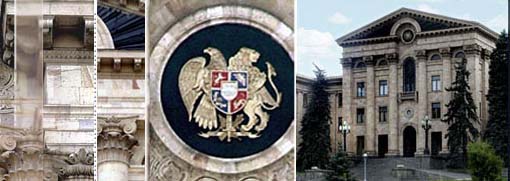Blowing the World Bank Whistle is an ongoing effort which started in 2004 with a Parliamentary Commission study into a World Bank financed project in the Republic of Armenia, and it continues on to an effort to persuade the Bank’s watchdog organisation, the Department of Institutional Integrity (INT), to instigate a full investigation into the wide-ranging and high-level fraud, corruption and embezzlement, exposed by the study.
In 2004, the Commission reported the fraud, corruption and embezzlement to the World Bank Armenia Country Manager and to the Department of Institutional Integrity, but by the end of 2006, rather than the problems being resolved, the individual who managed the study found that he had become the subject of World Bank ‘Whistleblower’ reprisals.
The whistleblower then found that the Bank's own Department of Institutional Integrity often prefers to punish whistleblowers rather than to solve the problems within the Bank and despite ever-increasing commitments by the major international institutions to clamp down on corruption, it is virtually impossible to find an organisation to support a claim against the Bank.
But Washington’s most influential human rights and freedom of speech organisation, the Government Accountability Project (GAP), after carefully studying the study documents, submitted a 'Demand Letter' to the INT, in support of a claim by the Whistleblower against the Bank. Later, the British Government, which had been informed of the problems since the time of the study in 2004, formally added its support.
On the 6th September, GAP released a report of its study into the INT and highlighted four claims of corruption in World Bank projects. This claim was one of those projects, and because of the wide-ranging nature of the corruption, plus the comprehensive and compelling evidence, GAP singled it out with a special request to the INT to conduct a full investigation. Armenia’s Municipal Development Project is now featured on GAP’s website.
Just prior to the GAP report, Mr. Shapiro of the World Bank’s Department of Institutional Integrity eventually responded to the letters from GAP, explaining that the INT has three categories for claims, ‘High’, ‘Medium’ and ‘Low’, and Armenia is ‘Medium’. Mr. Shapiro however declined to commit to when a full investigation will be carried out.
This claim has also been officially registered with the Volcker Panel, which has been studying INT operations and which released its report on the 13th September. The report does not feature any specific projects, because although according to the Volcker report, the “INT plays an important role in the Bank’s overall good governance and anti-corruption drive”, the “Purpose and Scope” of the Volcker Panel study was to “carry out a comprehensive review of the INT to assess how it can best contribute to the Bank’s poverty reduction mission and to safeguard the institution from legal, fiduciary and other risks”.
It is clear from the Purpose and Scope of the Volcker Panel study that the Bank is more concerned about its own security than about protecting the interests of those who would like a reduction in the level of corruption in World Bank projects, those generally referred to as ‘Whistleblowers’.
Prior to reading the Volcker Panel study report, it was assumed that the Armenian claim was near the bottom of the INT list for investigation, because according to INT procedures, low category claims are simply filed and receive no further attention. But the Volcker study has found that “Generally, INT has been able to investigate only high priority cases” and normally medium priority cases are NOT investigated.
So although an Armenian Parliamentary Commission has submitted comprehensive and compelling evidence to the World Bank, claiming tens of millions of dollars worth of corruption, according to Volcker, the Armenian people should not expect an INT inquiry.
In July the UK Foreign & Commonwealth Office established an ‘International Development Committee’, which invites organizations and individuals to “submit 'evidence' to ensure that assistance delivered through the World Bank is in line with the priorities and objectives of the Department for International Development (DFID)”. Details of this claim are being prepared as the basis for ‘evidence’ for the committee and that will include how the UK representation at the World Bank in Washington continually ignores letters from the British Ambassador in Armenia, in which he requests their support and information about the status of the claim.
The World Bank and the International Monetary Fund will be meeting in Washington at the end of October to present requests for continued finance to the U.S. Congress. GAP will be working with Congress to make sure it is aware of how inadequately the INT responds to claims of World Bank corruption. That will be followed by work with the U.S. Senate, which has just unanimously voted to investigate World Bank corruption.
Whilst the INT is deciding on how and when it may be able to respond to the 'Demand Letter' it received from GAP in March this year, Armenian corruption is being subjected to high-level exposure in Washington and in London; corrupt World Bank consultants continue with their corruption in Armenia; the World Bank Armenia country manager is free to orchestrate more corruption (now in Kyrgyzstan), and nine months after his departure from Armenia, the World Bank's Armenia office still awaits the arrival of its replacement country manager.
This blog covers the process from the beginning; it details the fraud and corruption, the Bank’s reprisals to the whistleblower, and continues with the ongoing action to persuade the Department of Institutional Integrity to initiate a full investigation into the matter.
Bruce Tasker
Senior Specialist
Armenian Parliamentary Commission (2004)
